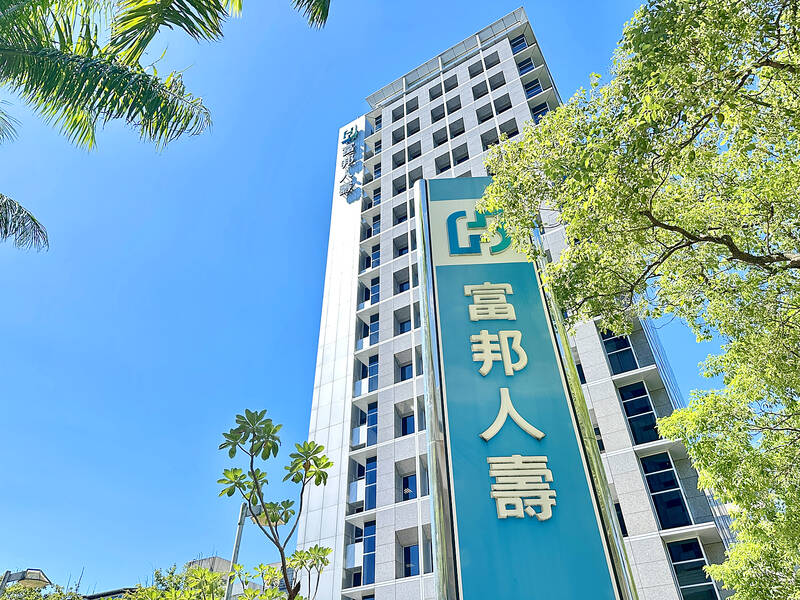Fubon Life Insurance Co (富邦人壽) on Wednesday sold US$650 million of 10.25-year subordinated bonds at a coupon rate of 5.45 percent, parent Fubon Financial Holding Co (富邦金控) said in a regulatory filing yesterday.
The insurer would use the proceeds to supplement and strengthen its working capital and financial structure, as well as increase its capital adequacy ratio as it is to adopt the nation’s new solvency system for the insurance industry, known as TW-ICS, next year, the filing said.
The bonds were issued by the insurer’s wholly owned offshore special purpose vehicle (SPV), Fubon Life Singapore Pte Ltd, with Fubon Life Insurance serving as the guarantor, which would unconditionally and irrevocably guarantee full payment, when due, of the principal and interest of the bonds, it said in a separate statement.

Photo: CNA
Fubon Life Insurance’s board of directors in April approved the establishment of the SPV in Singapore to help raise funds and bolster its financial health.
The sale also marks the first time a Taiwanese insurer has issued US dollar-denominated bonds with a par call option in global bond markets, which allows the insurer to redeem the debt within three months before maturity at its par value — helping reduce interest costs in the event of early refinancing, Fubon Life Insurance said.
The insurer said it held roadshows in Singapore and Hong Kong from Monday to Tuesday and received positive feedback from investors.
The insurer’s first bond sale in overseas markets was nearly three times oversubscribed, drawing more than US$1.9 billion in orders, it added.
Asia-Pacific investors accounted for 86 percent of the buyers of the bonds, it said.
In terms of investor structure, fund managers or asset management firms accounted for 82 percent, insurance companies or pension funds made up 11 percent, while banks, private banking and others contributed 7 percent, it added.
Fubon Life Insurance — along with other Taiwanese life insurers such as Cathay Life Insurance Co (國泰人壽), Nan Shan Life Insurance Co (南山人壽) and Shin Kong Life Insurance Co (新光人壽) — faces heightened risks to its earnings, capitalization and business-risk profile following the New Taiwan dollar’s 8 percent surge against the US dollar over two days in early May, Fitch Ratings has said.
Soaring foreign-currency hedging costs and the potential for further appreciation in the NT dollar would elevate the insurer’s risks going forward, the ratings agency said.

RUN IT BACK: A succesful first project working with hyperscalers to design chips encouraged MediaTek to start a second project, aiming to hit stride in 2028 MediaTek Inc (聯發科), the world’s biggest smartphone chip supplier, yesterday said it is engaging a second hyperscaler to help design artificial intelligence (AI) accelerators used in data centers following a similar project expected to generate revenue streams soon. The first AI accelerator project is to bring in US$1 billion revenue next year and several billion US dollars more in 2027, MediaTek chief executive officer Rick Tsai (蔡力行) told a virtual investor conference yesterday. The second AI accelerator project is expected to contribute to revenue beginning in 2028, Tsai said. MediaTek yesterday raised its revenue forecast for the global AI accelerator used

TEMPORARY TRUCE: China has made concessions to ease rare earth trade controls, among others, while Washington holds fire on a 100% tariff on all Chinese goods China is effectively suspending implementation of additional export controls on rare earth metals and terminating investigations targeting US companies in the semiconductor supply chain, the White House announced. The White House on Saturday issued a fact sheet outlining some details of the trade pact agreed to earlier in the week by US President Donald Trump and Chinese President Xi Jinping (習近平) that aimed to ease tensions between the world’s two largest economies. Under the deal, China is to issue general licenses valid for exports of rare earths, gallium, germanium, antimony and graphite “for the benefit of US end users and their suppliers

Dutch chipmaker Nexperia BV’s China unit yesterday said that it had established sufficient inventories of finished goods and works-in-progress, and that its supply chain remained secure and stable after its parent halted wafer supplies. The Dutch company suspended supplies of wafers to its Chinese assembly plant a week ago, calling it “a direct consequence of the local management’s recent failure to comply with the agreed contractual payment terms,” Reuters reported on Friday last week. Its China unit called Nexperia’s suspension “unilateral” and “extremely irresponsible,” adding that the Dutch parent’s claim about contractual payment was “misleading and highly deceptive,” according to a statement

Artificial intelligence (AI) giant Nvidia Corp’s most advanced chips would be reserved for US companies and kept out of China and other countries, US President Donald Trump said. During an interview that aired on Sunday on CBS’ 60 Minutes program and in comments to reporters aboard Air Force One, Trump said only US customers should have access to the top-end Blackwell chips offered by Nvidia, the world’s most valuable company by market capitalization. “The most advanced, we will not let anybody have them other than the United States,” he told CBS, echoing remarks made earlier to reporters as he returned to Washington